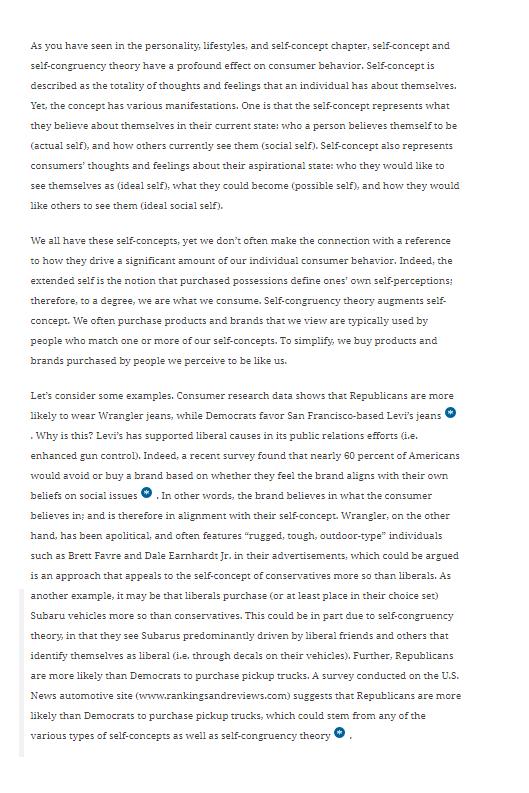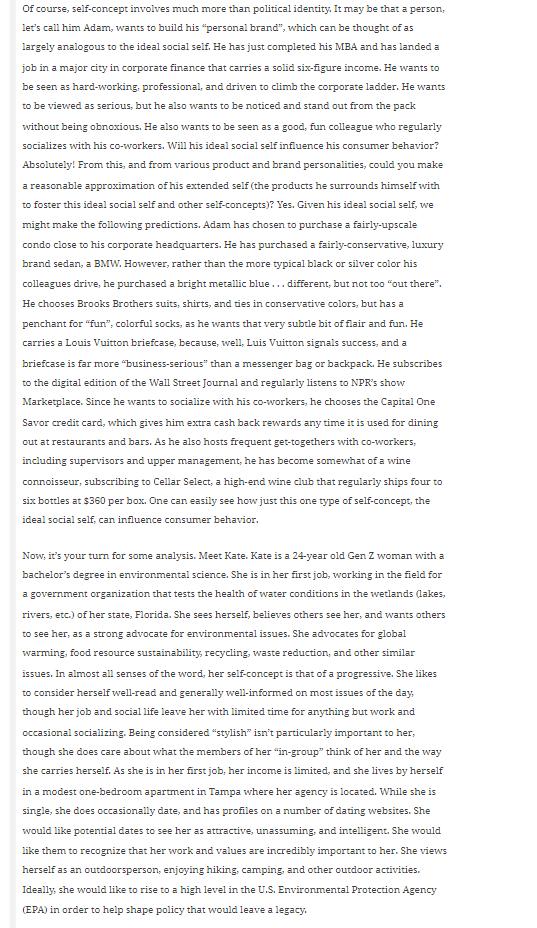Question
Answer the Following Questions: a. Given the description of Kate, what products, and what specific brands within certain product categories (for example, if she owns


Answer the Following Questions:
a. Given the description of Kate, what products, and what specific brands within certain product categories (for example, if she owns a vehicle, the brand and type of vehicle she owns) do you think are part of her extended self? Think of products in a broad and thorough sense. They may include physical goods such as clothing, vehicles, books, music, furniture, and services such as restaurants, personal care services, memberships and the like. Be as descriptive as possible in your description of her extended self.
b. Take some time for introspection. Thinking deeply, write a description of the characteristics [core beliefs, psychographics (activities, interests, and opinions)], etc. that define your actual self. What products, and what specific brands have you bought in certain product categories that reflect your actual self?
c. Do the same thing as you did in question two, except do this for your ideal and possible selves. Since as a student you may not have the financial resources to have already bought many of these products, don’t place any emphasis on whether or not you can currently afford these products and brands; what would you buy, if you could, to reflect these aspirational selves?
The purpose of this assignment is to allow you to analyze relevant themes of consumer behavior in a real-world scenario.
As you have seen in the personality, lifestyles, and self-concept chapter, self-concept and self-congruency theory have a profound effect on consumer behavior. Self-concept is described as the totality of thoughts and feelings that an individual has about themselves. Yet, the concept has various manifestations. One is that the self-concept represents what they believe about themselves in their current state: who a person believes themself to be (actual self), and how others currently see them (social self). Self-concept also represents consumers' thoughts and feelings about their aspirational state: who they would like to see themselves as (ideal self), what they could become (possible self), and how they would like others to see them (ideal social self). We all have these self-concepts, yet we don't often make the connection with a reference to how they drive a significant amount of our individual consumer behavior. Indeed, the extended self is the notion that purchased possessions define ones' own self-perceptions: therefore, to a degree, we are what we consume. Self-congruency theory augments self- concept. We often purchase products and brands that we view are typically used by people who match one or more of our self-concepts. To simplify, we buy products and brands purchased by people we perceive to be like us. Let's consider some examples. Consumer research data shows that Republicans are more likely to wear Wrangler jeans, while Democrats favor San Francisco-based Levi's jeans Why is this? Levi's has supported liberal causes in its public relations efforts (i.e. enhanced gun control). Indeed, a recent survey found that nearly 60 percent of Americans would avoid or buy a brand based on whether they feel the brand aligns with their own beliefs on social issues. In other words, the brand believes in what the consumer believes in; and is therefore in alignment with their self-concept. Wrangler, on the other hand, has been apolitical, and often features "rugged, tough, outdoor-type" individuals such as Brett Favre and Dale Earnhardt Jr. in their advertisements, which could be argued is an approach that appeals to the self-concept of conservatives more so than liberals. As another example, it may be that liberals purchase (or at least place in their choice set) Subaru vehicles more so than conservatives. This could be in part due to self-congruency theory, in that they see Subarus predominantly driven by liberal friends and others that identify themselves as liberal (i.e. through decals on their vehicles). Further, Republicans are more likely than Democrats to purchase pickup trucks. A survey conducted on the U.S. News automotive site (www.rankingsandreviews.com) suggests that Republicans are more likely than Democrats to purchase pickup trucks, which could stem from any of the various types of self-concepts as well as self-congruency theory
Step by Step Solution
3.30 Rating (159 Votes )
There are 3 Steps involved in it
Step: 1
a Based on the description of Kate her extended self includes products and brands that align with her selfconcept as a progressive environmental advocate wellread and informed and an outdoors enthusia...
Get Instant Access to Expert-Tailored Solutions
See step-by-step solutions with expert insights and AI powered tools for academic success
Step: 2

Step: 3

Ace Your Homework with AI
Get the answers you need in no time with our AI-driven, step-by-step assistance
Get Started


